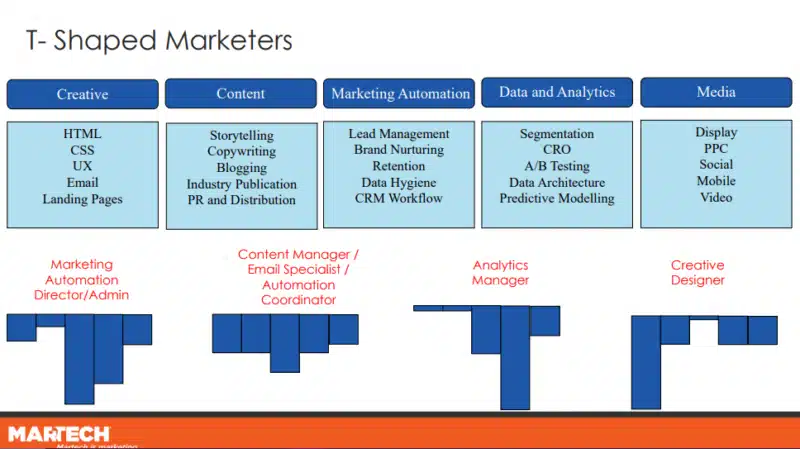Building your marketing team involves art and a science
In searching for marketing professionals to fill key roles, take some time to map out the different operations your team will be carrying out.
Because of the central role marketing plays in the success of any business through generating revenue and sales opportunities, there is a lot of pressure on the team to make the right hires. New team members have to be creative and also scientific.
Marketing is a career that rewards creativity, even when technology is used to carry out precise targeted campaigns. Straddling this balance between technical know-how and creative innovation is definitely an art. But it can also be approached in a deliberate, scientific way.
Scientific and artistic skill sets
“Anyone involved with marketing automation will have both a scientific and an artistic skillset,” said Ashley Cover, Marketing Technology Leader for Siena Corporation, at a MarTech panel discussion. “There are workflow builds, data segmentation and analytics to deal with, and those key capabilities are key to the science of automation.”
There are also artistic capabilities like email and landing page design, and even creative program development, she added.
In searching for marketing professionals to fill all these roles, take some time to map out the different operations your team will be carrying out.
“Every role within an automation team will gain an edge if you hire for both the art and science of automation,” Cover said. “You can look at the channels, you can look at email, somebody who’s going to do text marketing, messenger apps, etc. You also will need somebody to handle the development and creation of email, segmentation, and deal with data hygiene, people measuring analytics and measuring performance not just for email campaigns but across the platforms. And even [you’ll need] creative designers.”
There are also people needed on the team to execute tactical strategies in, for instance, how to use data to execute personalized messaging, she said.
Identifying roles for your team
It’s important to identify how members of your marketing team will interact with others internally and externally, either when dealing with technology in the organization or carrying out other tasks.
Steve Petersen, Marketing Technology Operations Manager for Western Governors University, advocates for an agile role approach to distinguishing specialized roles from integrated ones. The two basic types he uses under this approach are “T-shaped” and “I-shaped” roles. These roles come from software development, but they also can be useful in martech.
“A T-shaped person may be a programmer, whether that’s their specialty…they do have the ability to help out in other functions,” Petersen said. “And this is helpful because it can speed things up. But there can also be some confusion over who does what.”
Just be careful not to assign too many specialized tasks beyond this T-shaped person’s core experience. For instance, if someone is carrying out a data analyst function but doesn’t have the specific training in data science, they might misinterpret the data, which could have ramifications for the larger marketing operations team.
“The I-shaped practitioners are the people who are just a programmer, or maybe they only do QA,” he said. “The good thing about that there’s no confusion over who does what, who’s responsible and who owns something.”
Keep in mind when identifying these roles in the org that nobody fits purely into the T-shaped or I-shaped mold. Everybody should remain plugged in by using a helpful “RACI” chart, which helps clarify people’s roles according to these four categories: Responsible, Accountable, Consult and Informed.
Activating these roles throughout the organization
“Every organization is going to be different in terms of what you need and what you’re looking for from the T- and I-shaped perspective,” said Megan Michuda, Director of Marketing Operations and Innovation at BOK Financial.
The size of the company matters. “If you’re in a smaller organization like a startup, people are going to be wearing a lot of different hats,” she said. “You’re going to need a lot of T-shaped practitioners. If you’re in a really large organization, people may be more specialized and dig deeper into certain areas, and there may be clearer hand-offs in terms of responsibilities.”

To leverage the most out of your team, map out the more dynamic T-shaped marketers according to the skills required in different areas like content, creative and marketing automation.
“In the marketing automation bucket, you’re going to need people who understand data hygiene, who understand lead management and brand nurture programs, how to operate within a CRM platform, and in a B2B [marketing] environment,” Michuda said.
“I think the way to approach this as you’re assessing your team is to make this your own, think about what skills are needed depending on your organization…what skills you need, and then start to connect your team members and roles against those skills,” she explained.
With T-shaped practitioners, some have more experience in scientific or technical areas, while others are more artistic. Look at how deep each team member’s T-shaped experience goes and assign them to projects along those coordinates of creative or technical tasks.
“Looking through both lenses while hiring will allow for you to build and develop a team that is capable, flexible and innovative,” said Cover.
See the rest of this MarTech panel from our spring conference here.
Related stories
New on MarTech